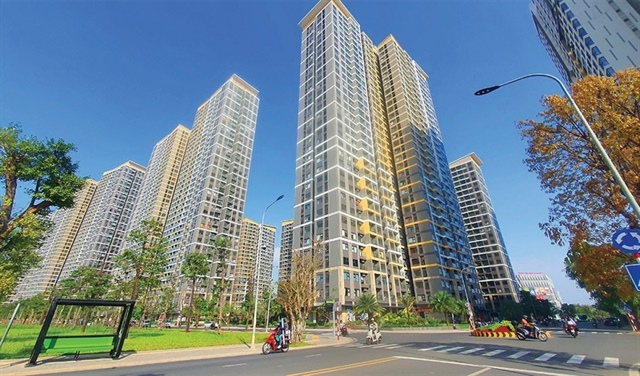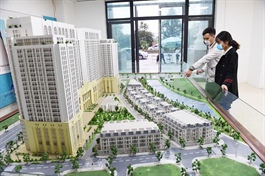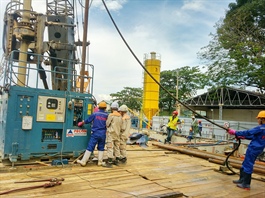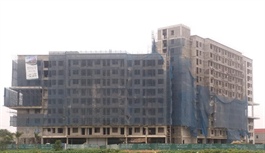Vietnamese experts concerned about soaring property prices given finance ministry’s proposed tax
Vietnamese experts concerned about soaring property prices given finance ministry’s proposed tax
Many economic experts have expressed concerns over a proposal to impose tax on property ownership by Vietnam's Ministry of Finance, saying that real estate prices in urban areas may skyrocket and stay beyond the reach of mid- and low-income homebuyers.

Nguyen Van Minh, an owner of a two-story boarding house in Kim Chung Commune, Dong Anh District, Hanoi, said he and his wife had taken out loans from a bank and their relatives to build the boarding house with 20 rooms, located on a 200-square-meter land lot that Minh had been given by his parents.
The boarding house helps the couple cover living expenses, repay the loans, and save VND15 million (US$650) each month.
“If a tax is levied on boarding houses and normal houses, we may see the amount of money we have saved for our old age shrinking,” Minh said.
Vu Thi Lanh, owning a house on To Hieu Street in Ha Dong District, Hanoi, said that she earns VND20 million ($870) every month from renting the house.
Half of the amount is spent on her kids’ tuition fee and the other half is for their living expenses.
“We pay full taxes on land, personal income, and value-added tax," Lanh said.
"If we have to be subject to another tax, we may find it hard to make ends meet.”
Nguyen Minh V., a resident in Linh Tay Ward, Thu Duc City under Ho Chi Minh City, said his apartment is leased out for VND8 million ($349) per month.
However, to buy the flat worth VND2.2 billion ($96,000), he and his wife had taken out a bank loan of more than VND1.2 billion ($52,300).
Therefore, the amount he earns from renting the flat is not enough for him to settle the debt.
“If a new real estate tax is applied, people like me will have to carry another burden, aside from the monthly interest of the bank credit," V. added.
"Meanwhile, the costs of food and groceries are surging following constant fuel price hikes.”
House purchase turns impossible
It is quite challenging for mid- and low-income earners to access housing in urban areas, awyer Truong Thanh Duc, from ANVI law company, told Tuoi Tre (Youth) newspaper.
As most people cannot afford a house, imposing a property tax should be carefully considered.
In reality, a budget apartment with an average size costs up to VND2 billion ($87,000) in big cities.
“Mid- and low-income people now have to set aside a significant part of their salary every month to be able to live in a small house," Duc explained.
"So it is not fair if they have to pay the property tax.”
Such property tax has been levied in many countries for a long time, but it does not mean that Vietnam should embrace this taxation model.
Actually, Vietnamese have been subject to the non-agricultural land use tax for years. Therfore, all housing and land tax policies should be reviewed before any decision to introduce the new property tax.
In particular, a database of information about housing and land must be set up for better management.
The government is implementing policies on tax reduction and interest subsidy to spur the economy after it has suffered from the COVID-19 pandemic for two years, according to Dr. Nguyen Ngoc Tu from the Hanoi University of Business and Technology.
Therefore, reducing taxes to support people and businesses should be mentioned first, Dr. Tu advised.
In order not to cause unnecessary panic for people, now is not the right time to introduce tax increases and new taxes.
According to lawyer Duc, taxes on house ownership and land use rights should be imposed on those whose property is worth over VND5 billion ($518,000).
However, the Ministry of Finance needs to study and consider related issues and field comments from the public and relevent agencies to offer a reasonable tax rate.
Besides, the more land and houses individuals own, the higher tax they have to pay. Yet, the first taxable threshold should be as low as possible.
"Those who have many houses and large land plots in downtown have to pay higher taxes," he said.
"The state does not encourage individuals to use or own many land plots as the land bank is limited and should be set aside for building parks and factories."
Luu Trung Thai, investment director of Dat Xanh Da Nang Joint Stock Company, said that the real estate tax is just to break the tip of the iceberg of real estate speculation.
“Creating a transparent market and managing cash flows in the real estate sector are the key to all," Thai remarked.
"Once the government can control investment and speculation, it will collect more tax from transactions rather than implementing a new property tax."
On the other hand, homebuyers will suffer a loss if the new tax is applied to all, as housing developers will include the rate in their selling prices.
























